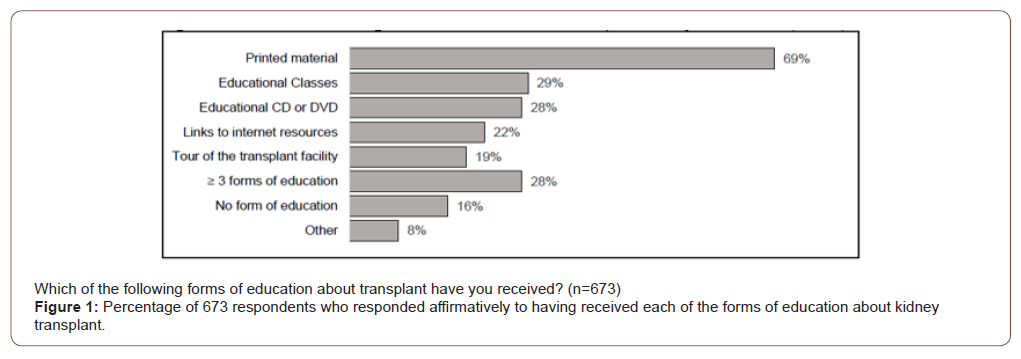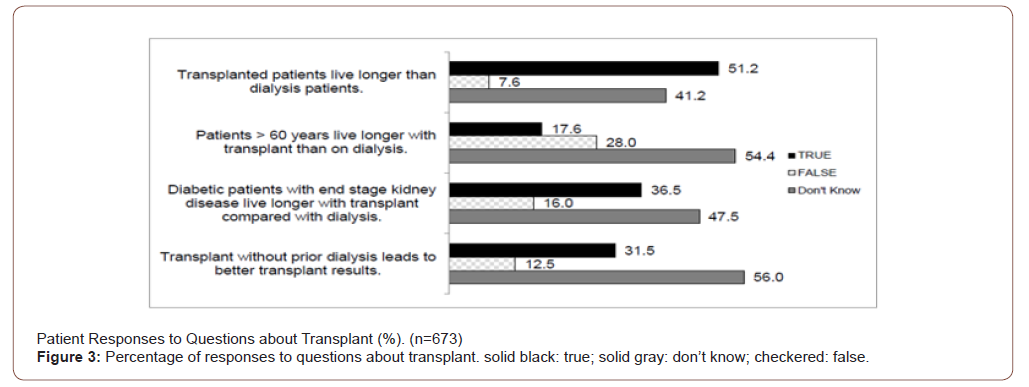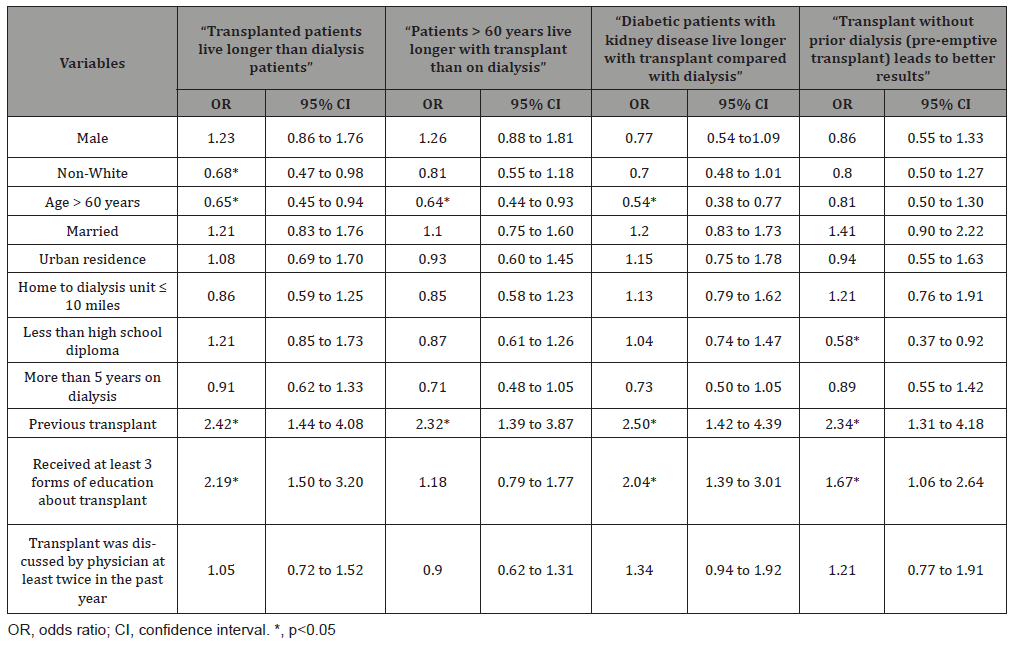 Research Article
Research Article
Knowledge about Benefits of Kidney Transplantation: A Survey of Dialysis Patients
Valerie Nwanji MD, Aria Ghahramani BA and Mujahed Dauleh MD and Nasrollah Ghahramani* MD MS
Pennsylvania State University, College of Medicine, USA
Nasrollah Ghahramani, Pennsylvania State University, College of Medicine, USA, 500 University Drive, P.O. Box 850, Hershey, PA, 17033-0850, USA.
Received Date: April 22, 2021; Published Date: May 13, 2021
Abstract
Background: Knowledge about benefits of kidney transplantation (KT) is an important determinant of the patients’ decision to pursue KT. We investigated factors associated with End Stage Renal Disease (ESRD) patients’ knowledge about KT benefits.
Methods: We randomly invited 1,400 dialysis patients to complete a survey about benefits of KT. Using multivariate analysis, we calculated odds ratios for the probability of choosing the correct responses.
Results: Of 673 participants, 17.6% agreed with benefit of KT for older patients, 36.5% agreed with benefit of KT for diabetic patients, and 31.5% agreed with benefit of pre-emptive KT. Non-white (OR: 0.68) and older (OR: 0.65) participants were less likely to agree with the survival benefit of KT. Older participants were less likely to agree with benefit of KT for older (OR: 0.64), and diabetic patients (OR: 0.54). Participants with less than high school education were less likely to agree with benefit of pre-emptive KT (OR: 0.58). Participants with a previous KT were more likely to agree with benefit of KT for older (OR: 2.32), and diabetic patients (OR: 2.50), and with the benefit of pre-emptive KT (OR: 2.34). Participants who had received 3 or more modes of education about KT were more likely to agree with benefit of KT for diabetic patients (OR: 2.04), and with benefit of pre-emptive KT (OR:1.67).
Conclusions: Dialysis patients have limited knowledge about benefits of KT. Previous KT, exposure to 3 or more modes of KT education, and education attainment are significant contributors to knowledge about KT benefits.
What is already known about this subject
• The quality and frequency of education patients receive about kidney transplantation (KT) has a significant effect in the patients’ decision to pursue KT.
• Lack of understanding of the benefits of KT can lead to patients having negative perceptions and views about KT.
• Patients who have been educated about the benefits are less likely to deny KT.
What this study adds
• Among patients with ESRD, overall knowledge of the survival benefits of KT compared with dialysis is limited.
• The lack of knowledge is more salient among non-white patients, those with less than a high school education, and those older than 60 years of age.
• Receiving multiple modes of education about KT is associated with improved knowledge about the benefits of KT.
Impact on practice or policy
• Multi-modal educational programs especially targeting minority and older populations can lead to increased knowledge and ultimately pursuit of KT.
Keywords:Dialysis; Education; Knowledge; Nephrologists; Transplantation; Chronic kidney disease
Introduction
For patients living with chronic kidney disease (CKD), kidney transplantation (KT) is the preferred treatment compared with dialysis [1]. KT provides overall better quality of life (QOL) and increased survival. The decision to pursue KT is influenced by various factors. The quality and frequency of education patients receive about KT has a significant effect in the decision-making process. Patient education requires availability of resources and tailoring of information to assist with the decision to choose KT as the ultimate treatment goal [2,3]. How well the information is delivered can also influence patients’ decisions. Patients with end stage renal disease (ESRD) are usually faced with a decisional conflict when considering treatment options. Patients who are faced with a decisional conflict may also have less education and less knowledge about KT [4]. Lack of understanding of the benefits of KT can lead to patients having negative perceptions and views about KT. There is insufficient discussion between nephrologists and their patients about KT [5]. Studies have shown that those who have been educated about the benefits are less likely to deny KT [6,7]. The education provided by nephrologists can be beneficial in increasing patients’ willingness to receive a KT. Sufficient knowledge and understanding can lead to optimization of therapies [8]. More opportunities to address patients’ concerns can increase their awareness of the long-term benefits of KT [9]. Participation in educational activities focused on KT using multiple sources of information, along with discussions between nephrologists and patients is likely to increase willingness to consider KT. We investigated the knowledge of ESRD patients about the benefits of KT, and we also examined the factors that affect patients’ knowledge, including the variety of education patients receive, and the number of discussions nephrologists have with their patients in regard to KT.
Materials and Methods
Following approval from the Institutional Review Board (IRB) of Pennsylvania State University College of Medicine, we sent flyers to 1,283 dialysis units. Among the 2,536 interested patients with ESRD who fulfilled inclusion criteria, we randomly invited 1,400 to complete a questionnaire by which we probed knowledge about benefits of KT. Using multivariate analysis, we calculated odds ratios and 95% confidence intervals for the probability of responding correctly to each of 4 questions about benefits of KT. Independent variables were demographic factors; modes of education about KT and; frequency of discussion about KT by physician.
Results
The number of respondents to the questionnaire was 673 (response rate: 48%). Table 1 illustrates the demographic characteristics of the respondents. The majority of participants (69%) indicated that they had received printed material as form of education on KT (Figure 1). More than half of the participants (53%) indicated that their physician had either not discussed the option of KT (29%) or had discussed it only once (24%) in the past year (Figure 2). Figure 3 illustrates participants’ responses to questions about KT: 51% agreed with the statement that transplanted patients live longer than dialysis patients, 17.6% agreed with the statement that patients older than 60 years live longer with KT than on dialysis, 36.5% agreed with the statement that diabetic patients with kidney disease live longer with KT compared with dialysis, and 31.5% agreed with the statement that pre-emptive KT leads to better KT results.

Table 1:Demographic characteristics of patients (n=673)



In multivariable analysis (Table 2)
Table 2:Multivariable analysis of likelihood of agreement with the statement about transplant.

• Non-white participants were less likely to agree with the statement that transplanted patients live longer than dialysis patients (OR: 0.68; CI: 0.47 to 0.98).
• Participants older than 60 years were less likely to agree with the statements that
o transplanted patients live longer than dialysis patients (OR: 0.65; CI: 0.45 to 0.94).
o patients older than 60 live longer with KT than with dialysis (OR: 0.64; CI: 0.44 to 0.93).
o diabetic patients with kidney disease live longer with KT compared with dialysis (OR: 0.54; CI: 0.38 to 0.77).
• Participants with less than a high school diploma were less likely to agree with the statement that KT without prior dialysis leads to better results (OR: 0.58; CI: 0.37 to 0.92).
• Participants with previous KT(s) were more likely to agree with the statements that:
o transplanted patients live longer than dialysis patients (OR: 2.42; CI: 1.44 to 4.08).
o patients older than 60 years live longer with KT than on dialysis (OR: 2.32; CI: 1.39 to 3.87).
o diabetic patients with kidney disease live longer with KT compared with dialysis (OR: 2.50; CI: 1.42 to 4.39).
o KT without prior dialysis leads to better results (OR: 2.34; CI: 1.31 to 4.18).
• Participants who had received 3 or more modes of education about KT were more likely to agree with the statements that:
o transplanted patients live longer than dialysis patients (OR: 2.19; CI:1.50 to 3.20).
o diabetic patients with kidney disease live longer with KT compared with dialysis (OR:2.04; CI:1.39 to 3.01).
o KT without prior dialysis leads to better results (OR:1.67;CI:1.06 to 2.64).
Discussion
This study showed that among patients with ESRD, overall knowledge of the survival benefits of KT was limited, particularly among non-white patients, those with less than a high school education, and those older than 60 years of age. Only half of the patients were aware of the survival benefit of KT compared with dialysis, and only a minority of patients were aware of the benefits of KT for patients older than 60, for diabetic patients, and benefits of pre-emptive KT.
This study confirms findings from previous studies that have shown that a significant proportion of patients with ESRD are not informed about treatment options [4]. Studies have also shown that patients who receive limited information about KT are less likely to be listed for KT [10]. Information that is received is often not sufficient to facilitate decision making about the treatment options. In addition to late nephrology referral, lack of effective educational programs after nephrology referral has also been highlighted as an important contributor to the limited knowledge of patients with ESRD about treatment options [11].
Our study also confirms previous studies which showed that patients who were enrolled in transplant education programs, using multiple modes of information, had increased knowledge of KT and were more likely to be prepared for living donor KT [12]. These multi-modal sources of information, which include videos, printed materials, and KT education discussions, are most effective among minorities, especially African Americans [7].
Persons with ESRD, particularly those seeking KT encounter numerous decision points that require sufficient health literacy [13]. Older age, lower socioeconomic standing, and lower educational attainment are associated with limited health literacy [14]. These factors are also associated with higher risk for development and progression of CKD. Health literacy is limited among patients with CKD, especially among non-white individuals and those with low socio‐economic status [15]. The limited health literacy stems, in part from lack of tailored education [13].
There is a complex interplay between nephrologists’ attitudes about KT, perceptions of suitability of patients for transplant, the information they provide to patients, and how that information influences the patients’ decision to pursue transplant. Nephrologists’ demographic and practice characteristics have been shown to influence their attitudes about KT as the treatment of choice for ESRD, preemptive KT, and KT as an option for older patients [16]. In a qualitative study, in response to the question of why a patient might not choose to pursue KT, one of the major reasons presented by the nephrologists was deficiencies in understanding the transplant process, inadequate education about the available options, and older age [17]. Similarly, in a study of factors considered by nephrologists in excluding patients from KT referral, limited understanding of the process due to patient’s inadequate education was a significant factor considered by nephrologists as important in not referring patients for KT evaluation [18]. In a focus group study of patients with CKD, urban patients were more likely to have received supplementary information and to have been strongly encouraged by their nephrologists to seek transplant [19].
We conclude that dialysis patients have limited knowledge about survival benefits of KT compared with dialysis. Only a minority of patients are aware of the benefits of KT for patients older than 60, for diabetic patients, and benefits of pre-emptive KT. Previous KT, exposure to 3 or more modes of education about KT, and education attainment are significant contributors to knowledge about benefits of KT. Other factors include non-white race and age older than 60. Multi-modal educational programs especially targeting minority and older populations can lead to increased knowledge and ultimately pursuit of KT.
Acknowledgment
The authors wish to thank the Pennsylvania State University Survey Research Center for assistance in the design, distribution and collection of the survey.
Funding
Dr. Nasrollah Ghahramani was funded by the National Institutes of Health (K23DK084300). The content is solely the responsibility of the authors and does not necessarily represent the official views of the NIDDK or the NIH.
Conflict of Interest
The authors have no conflict of interest to declare.
References
- Tonelli M, Wiebe N, Knoll G, S Browne, D Jadhav, et al. (2011) Systematic Review: Kidney Transplantation Compared with Dialysis in Clinically Relevant Outcomes. Am J Transplant 11(10): 2093-2109.
- Murray MA, Brunier G, Chung JO, Lee Ann Craig, Cynthia Mills, et al. (2009) A systematic review of factors influencing decision-making in adults living with chronic kidney disease. Patient Educ Couns 76(2): 149-158.
- Tsang JY, Blakeman T, Hegarty J, Humphreys J, Harvey G (2016) Understanding the implementation of interventions to improve the management of chronic kidney disease in primary care: a rapid realist review. Implement Sci 11: 47.
- McPherson L, Basu M, Gander J, Stephen O Pastan, Sumit Mohan, et al. (2017) Decisional conflict between treatment options among end-stage renal disease patients evaluated for kidney transplantation. Clin Transplant 31(7).
- Laouad I, Hbali G, Mouhoub R, Fadili W, Lisri M, et al. (2011) Knowledge and attitudes of Moroccan hemodialysis patients toward renal transplantation: did we inform our patients enough? Transplant Proc 43(2): 445-447.
- Coulter A, Ellins J (2007) Effectiveness of strategies for informing, educating, and involving patients. BMJ 335(7609): 24-27.
- Ilori TO, Enofe N, Oommen A, Oluwaseun O, Akinlolu Ojo, et al. (2015) Factors affecting willingness to receive a kidney transplant among minority patients at an urban safety-net hospital: a cross-sectional survey. BMC Nephrol 16: 191.
- Gómez CG, Valido P, Celadilla O, Bernaldo de Quirós AG, Mojón M (1999) Validity of a standard information protocol provided to end-stage renal disease patients and its effect on treatment selection. Perit Dial Int 19(5): 471-477.
- Patzer RE, Basu M, Larsen CP, Stephen O Pastan, Sumit Mohan, et al. (2016) iChoose Kidney: A Clinical Decision Aid for Kidney Transplantation Versus Dialysis Treatment. Transplantation 100(3): 630-639.
- Kucirka LM, Grams ME, Balhara KS, Jaar BG, Segev DL (2012) Disparities in provision of transplant information affect access to kidney transplantation. Am J Transplant 12(2): 351-357.
- Finkelstein FO, Story K, Firanek C, Paul Barre, Tomoko Takano, et al. (2008) Perceived knowledge among patients cared for by nephrologists about chronic kidney disease and end-stage renal disease therapies. Kidney Int 74(9): 1178-1184.
- Waterman AD, Peipert JD (2018) An Explore Transplant Group Randomized Controlled Education Trial to Increase Dialysis Patients' Decision-Making and Pursuit of Transplantation. Prog Transplant 28(2): 174-183.
- Berkman ND, Sheridan SL, Donahue KE, Halpern DJ, Crotty K (2011) Low health literacy and health outcomes: an updated systematic review. Annals of internal medicine 155(2): 97-107.
- Dageforde LA, Cavanaugh KL (2013) Health literacy: emerging evidence and applications in kidney disease care. Adv Chronic Kidney Dis 20(4): 311-319.
- Taylor DM, Fraser SDS, Bradley JA, Clare Bradley, Heather Draper, et al. (2017) A Systematic Review of the Prevalence and Associations of Limited Health Literacy in CKD. Clin J Am Soc Nephrol 12(7): 1070-1084.
- Ghahramani N, Karparvar ZY, Ghahramani M, Shrivastava P (2011) Nephrologists' perceptions of renal transplant as treatment of choice for end-stage renal disease, preemptive transplant, and transplanting older patients: an international survey. Exp Clin Transplant 9(4): 223-229.
- Ghahramani N, Sanati Mehrizy A, Wang C (2014) Perceptions of patient candidacy for kidney transplant in the United States: a qualitative study comparing rural and urban nephrologists. Exp Clin Transplant 12(1): 9-14.
- Bartolomeo K, Tandon Gandhir A, Lipinski M, Romeu J, Ghahramani N (2019) Factors Considered by Nephrologists in Excluding Patients from Kidney Transplant Referral. Int J Organ Transplant 10(3):101-107.
- Ghahramani N, Wang C, Sanati Mehrizy A, Tandon A (2014) Perception about transplant of rural and urban patients with chronic kidney disease; a qualitative study. Nephrourol Mon 6(2): e15726.
-
Valerie Nwanji MD, Aria Ghahramani BA and Mujahed Dauleh MD, Nasrollah Ghahramani MD MS. Knowledge about Benefits of Kidney Transplantation: A Survey of Dialysis Patients. 2(5): 2021. AUN.MS.ID.000550.
-
Dialysis, Education, Knowledge, Nephrologists, Transplantation, Chronic kidney disease
-

This work is licensed under a Creative Commons Attribution-NonCommercial 4.0 International License.






